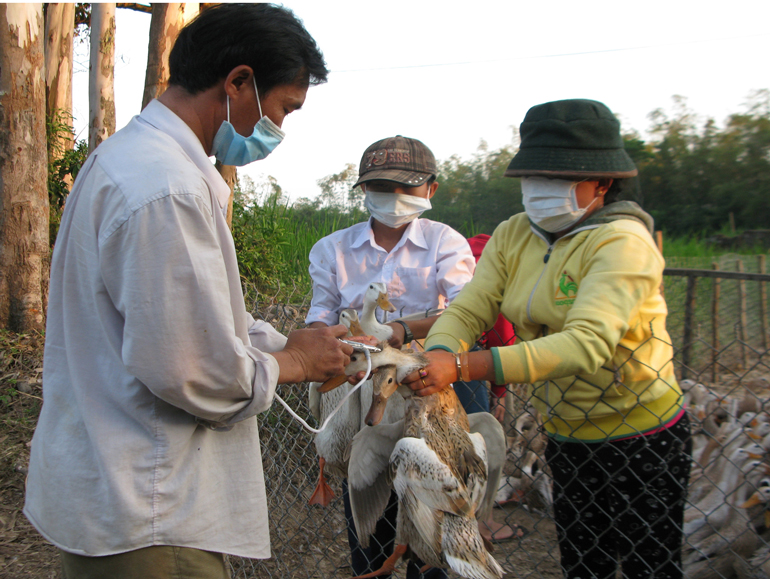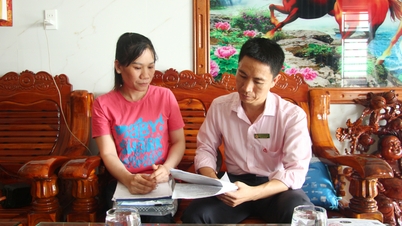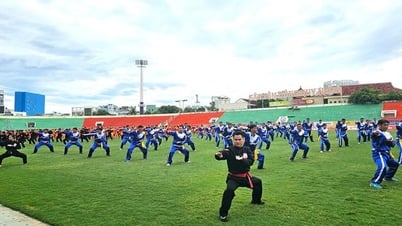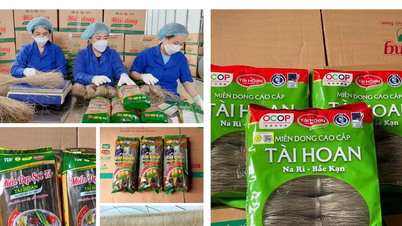Many people have placed high hopes on the duck farming season to reduce costs and offset the losses they have had to bear for nearly half a year, but currently, duck farmers are unable to let their ducks run because of the harsh weather and dry, cracked fields.
 |
| Veterinary staff at Tuy An district vaccinate local ducks against bird flu. Photo: NGUYEN CHUONG |
Long-term losses
Despite spending VND150 million to rent 300 hectares of harvested rice fields from several localities to take advantage of the food spilled on the fields to raise ducks, up to now, Mr. Nguyen Van Dang's family in Hoa Quang Bac commune (Phu Hoa district) has not been able to feed the ducks in the fields. Currently, the whole flock eats 18 bags of bran every day at a cost of about VND6.5 million.
Mr. Dang said: It has not rained since March, the fields are dry and cracked, so the rice cannot grow; crabs and snails in the fields also have difficulty surviving, so the ducks cannot run in the fields. Meanwhile, there is only a little over a month left until the new crop season begins. Duck farmers hope for rain soon so that the ducks can eat in the fields for a few days, recovering some of the field rent.
“Currently, I have to feed the ducks completely with bran and pump well water for them to drink, but the egg-laying rate is only over 80%. Every night, my family has to pay a loss of 200,000 VND for food, not to mention the cost of hiring someone to pour bran,” said Mr. Dang.
Along with that, since after Tet until now, the price of duck eggs has dropped, the income is not enough to cover the expenses, so all households raising laying ducks have suffered heavy losses. According to Mr. Nguyen Van Dang, after Tet, duck eggs dropped to 16,000 VND/dozen (10 eggs), then increased to 17,000 VND/dozen and now when the flocks of laying ducks in Ninh Thuan are not many, Phu Yen duck eggs have just increased to 18,000 VND/dozen.
However, with this price, if we raise pure feed, farmers still have to make up for the loss. “Since Tet, my family has lost nearly 100 million VND in feed. At first, I was waiting for the rice-eating season to recover, but with this situation, it is impossible. Recently, my family sold 3,000 ducks to farmers in Ninh Thuan to feed them there, keeping 4,600 ducks,” said Mr. Dang.
Many other duck-laying households also choose the same option as Mr. Dang's family. Mrs. Tran Thi Thanh in Hoa Tri commune (Phu Hoa district) said: Before, when my husband was still healthy, after the local feeding season, we would rent a car to take the ducks to the southern provinces to feed. But now my husband and I are no longer healthy, it is difficult to travel, and we cannot run the feeding season in the countryside, so I decided to sell 3,500 laying ducks to others, so my family can worry less about the daily feed cost.
According to duck breeders, to make a profit, duck eggs must cost from 20,000 VND/dozen and the egg laying rate must be from 85-90%. However, the weather is too hot, ducks eat less so the egg laying rate also decreases, and to stimulate ducks to lay eggs, breeders must supplement food, water, minerals and vitamins, increasing costs.
On average, to raise 1,000 laying ducks, you have to feed them 4 bags of bran every day, about 1.6 million VND (price at the dealer). But after each night, the ducks only lay 850 eggs, sold for 18,000 VND/dozen, the breeder has to pay 70,000 VND for food, not to mention other costs.
Do not neglect epidemic prevention
Currently, when duck eggs are losing value, most duck farmers are not earning enough to cover their expenses, so many people are discouraged and neglect disease prevention for their poultry flocks. While bird flu is still occurring in many provinces and cities across the country, coupled with the arrival of the field-running season, the risk of infection and outbreaks of bird flu and cholera is very high. According to the provincial Department of Animal Husbandry and Veterinary Medicine, in addition to losses due to low egg prices, if people do not proactively and actively prevent diseases for their poultry flocks, the risk of disease outbreaks is very high, and the damage will be much greater.
The provincial veterinary department is coordinating with localities to organize bird flu vaccination, and has so far administered 140,000 doses. Compared to the total flock of about 4.5 million birds, the number of birds vaccinated against bird flu is still very limited. Localities need to further promote propaganda and mobilize livestock farmers to vaccinate poultry to increase vaccination rates and ensure the effectiveness of disease prevention. Mr. Nguyen Van Lam, Head of the Provincial Department of Animal Husbandry and Veterinary Medicine |
With the current hot weather, poultry bodies have difficulty adapting, so their resistance is reduced, while the farming environment always contains viruses, increasing the risk of infection if farmers do not clean and disinfect regularly. To limit the risk of disease, farmers must fully vaccinate against epidemics according to regulations of the Veterinary sector, proactively clean and disinfect the farming environment periodically, provide enough food and water to improve health and increase resistance for poultry...
Mr. Nguyen Ngoc Duc, Manager of the Phu Hoa District Animal Husbandry and Veterinary Station, said: The total poultry flock in the district is about 420,000, including about 200,000 ducks. Currently, the locality has vaccinated 79,000 doses of bird flu vaccine. We are continuing to organize vaccinations, and expect to finish the vaccination campaign by the end of May.
In addition, the station is also coordinating with communes and towns to propagate and guide people to implement disease prevention measures for livestock, including poultry. The station also strengthens control of the purchase, sale and slaughter of livestock and poultry in the area, all cases of importing and exporting flocks must ensure compliance with regulations.
According to the Tuy An District Animal Husbandry and Veterinary Station, the station will closely monitor the quantity and check vaccination certificates when there are flocks of ducks running in the fields; encourage people to proactively report to authorities when they discover flocks of ducks running in the fields from other places; and at the same time, promote vaccination, especially in high-risk areas and old epidemic areas.
Narcissus
Source









































































































Comment (0)